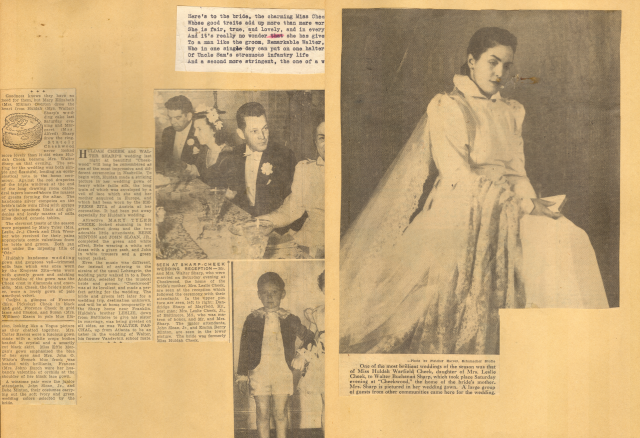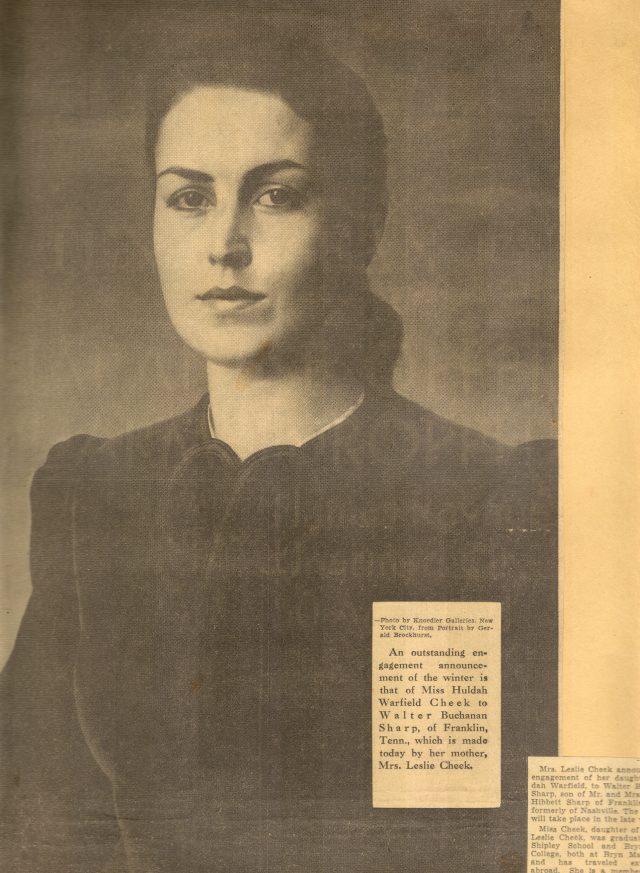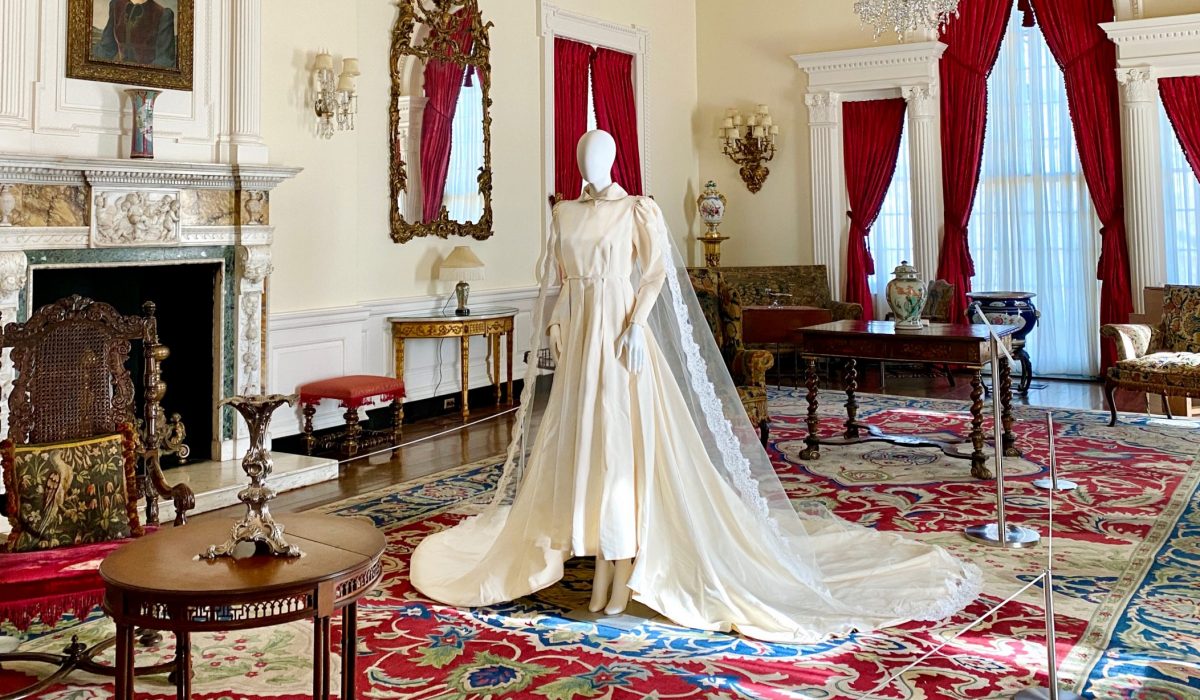She is dressed always in white, with a veil of lace or tulle. Usually she carries a bridal bouquet of white flowers…or maybe she holds a long sheaf of stiff flowers such as lilies on her arm. Or perhaps she carries a prayer book instead of a bouquet.”
Emily Post, Etiquette, 1922
A prayer book was Huldah Warfield Cheek’s preference for her wedding to Walter Buchanan Sharp on Valentine’s Day, 1942, when she chose a white “Elizabethan period gown” of faille silk and ivory satin. Her illusion train, “attached at the shoulder and falling full length to the floor, was finished with a deep border of lace purchased in Europe by her mother and prized for its former adornment of the Empress Zita of Austria at her coronation. The neckline of the gown featured the Cheek family crest in diamonds and emeralds.
The setting for the 8:30 p.m. nuptials, “both simple and beautiful,” wrote an admiring society columnist, “lent an ecclesiastical note to the home ceremony. Against the red draperies of the triple windows at the end of the long drawing room, cathedral tapers burned above the masses of greens forming the altar.”
The sumptuous floral design was a midwinter triumph: “The silver compotes on the bride’s table were filled with sprays of white specimen lilies and gardenias, and lovely masses of calla lilies decked the console tables.” The wedding party processed to a Bach Andante instead of the customary strains of Richard Wagner’s Lohengrin. The Rev. Bernard Hummel, rector of St. Ann’s Episcopal Church, officiated, after which the bride’s mother welcomed guests to a reception, where Mr. Sharp’s parents assisted in receiving. Friends offered lighthearted toasts in keeping with the couple’s enjoyment of verse (“She is fair, true, and lovely, and in every way smart,/ And it’s really no wonder she has given her heart….”) Later in the evening, Mr. Sharp and his bride departed for their wedding trip.

No wedding in the first several decades of the twentieth century took place without a close reading of Mrs. Emily Post’s authoritative Etiquette: The Original Guide to Conduct in Society, Business, Home, and More. Over several editions, Mrs. Post was the wellspring of knowledge and guidance for every occasion, and her chapters ferried the debutante from her presentation to Society through chaperonage in dodgy places where she might be seen “gadding about” during courtship. (“No invitation of a gentleman mentions that there will be a chaperone present because that is taken for granted.”)
On to “Engagement”: “It is the immediate duty of the man to go to the girl’s father or her guardian and ask his consent.” The young woman has “most likely” told her mother first of all, wrote Mrs. Post, who instructed the bride’s mother or her representative “to call the various newspapers by telephone to report the engagement.” Thus Nashville opened its Tennessean and Banner newspapers the winter of 1941 to find a portrait photograph of a lovely young woman and the following: “An outstanding engagement of the winter is that of Miss Huldah Warfield to Walter Buchanan Sharp, of Franklin, Tennessee, which is made today by her mother.”
Etiquette proceeds in a mosaic of preparations for the wedding—rather, the selection of the wedding, whether “A Small Wedding,” an “Average Fashionable Wedding,” “The Most Elaborate Wedding Possible,” or the “Wedding of a Cinderella.” For her daughter’s nuptials, Mabel would have focused on the most elaborate wedding and tailored preparations accordingly, given the fact of the current World War II and the bridegroom’s drafting into military service.
Leading to Valentine’s Day, 1942, the activities accelerated to the invitations, the bridesmaids and their gowns, the best man and groomsmen, the ushers, the gifts and their artful display, the music, the bride’s trousseau, and on to Mrs. Post’s detailed, lengthy Chapter XXII: “THE DAY OF THE WEDDING.”
Visitors to the Cheekwood mansion this February can time travel to the Cheek-Sharp wedding with the rare exhibition of Huldah Warfield Cheek Sharp’s beautifully preserved wedding gown.


Blog post provided by Cheekwood’s Writer-in-Residence, Cecelia Tichi, Ph.D.
Cecelia Tichi is an award-winning author and Professor of English and American Studies Emerita at Vanderbilt University. Her books span American literature and culture from colonial days to modern times, but her recent work draws upon the Gilded Age (post-1870) that prompted her book on Jack London and another on seven activists in that tumultuous era.
Cecelia’s research and teaching inspired What Would Mrs. Astor Do? The Essential Guide to the Manners and Mores of the Gilded Age, followed by Gilded Age Cocktails and Jazz Age Cocktails , which set the stage for her mystery crime novels that boast “Gilded” in each title.
Cecelia can be followed on her website: https://cecebooks.com/
